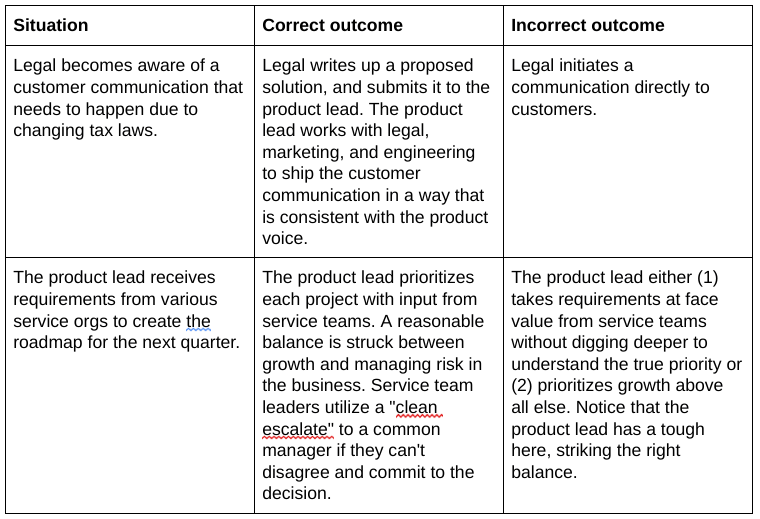There is a lot of variety in how companies are run. Some companies have design, legal, engineering, or ops act as final decision makers on new product features. Some companies have a single decision maker while others opt for committees or “two in a box” decision making.
Each of these can work, and there is no right or wrong answer. But it is important to have a clear policy/philosophy in each company so that everyone is on the same page about how work gets done.
At Coinbase, our philosophy is to use product leads as DRIs (directly responsible individuals) on all projects which impact customers.
We use DRIs because it helps us move quickly when there is a single decision maker. And we choose product leaders to be the DRIs, at least for decisions that impact customers, because we are a customer focused company. We want decisions to be driven by what will create the best customer experience. Over the long term, optimizing for customer experience is 100% aligned with what is best for shareholders, regulators, and employees. Happy customers lead to a thriving business that is good for society, with a number of positive downstream effects.
What does this mean in practice?
Let’s walk through some examples. Note that these are illustrative, and not meant to be critical of any particular function.

In situations like those above, we try to work together to co-create good outcomes for the business, with a single DRI making the final decision.
Will we miss out on other valuable perspectives if the product lead is the DRI?
Having a product lead as a DRI does not mean that they originate all the ideas for the product, or that they do all the work. Great products are the result of collaboration among many different teams in the company, and good ideas can come from anywhere. However, we choose to have one person responsible for coordinating and being the final decision maker on all those efforts. The product lead must take requirements from various groups, and prioritize them appropriately, to be effective. They are also held accountable for doing this job, which means they will often have Key Results that we track over time where they are named as the DRI.
Do we use product leads as the DRI on projects that don’t impact customers?
No. We try to use product lead DRIs for areas of the business that impact customers. But there are examples, such as moving to a new office, which is not intended to have a customer impact. There is a lot of grey area here, and it’s not always clear how directly a customer is impacted (for instance, if we were to make a change to our legal entity structure). The goal in these situations is to default to using product leads as DRIs, but we don’t need to be dogmatic about this.
What do we do when a product lead is not available?
If there isn’t a product lead available, we periodically name other employees as DRIs on projects with a customer facing component. But we default to using product leads when one is available.
The above is a document that I shared internally at Coinbase to help create clarity as we continue scaling.
If you’re interested in learning more about what it’s like to work at Coinbase, please apply for a role through our careers website. Thank you!
Coinbase is a product led company was originally published in The Coinbase Blog on Medium, where people are continuing the conversation by highlighting and responding to this story.
via The Coinbase Blog - Medium https://blog.coinbase.com/coinbase-is-a-product-led-company-d8f03549f498?source=rss----c114225aeaf7---4
No comments:
Post a Comment